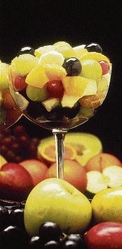
Oxidation occurs naturally. A slice of apple or peeled banana turns brown. Fish easily spoils. A cut on your skin gets inflamed. Iron exposed to the air rusts and discolours.
This also happens to the cells in our bodies. Progressive oxidation is a major reason why our bodies age.
We literally rust away. Oxidation is quite different from another very healthy process called oxygenation.
FREE RADICALS
Oxidation is due to special chemicals called free radicals. Free radicals are oxidants that damage our cells by oxidation. We cannot totally avoid free radicals damage as we age. Hardening of the arteries, cataracts in the eyes and wrinkling of the skin are all examples of free radical damage.
Free radicals arise from sources inside and outside our bodies. Normally, our cells produce a small quantity of free radicals, much like a car engine that emits fumes. Those free radicals are generally not a big problem as they are normally controlled by the antioxidants that the body naturally produces.
On the other hand, external free radicals form in large quantities from environmental factors such as poor diet, pollution, radiation, smoking and alcohol. It is hard for the body's defences to cope with them.
ANTIOXIDANTS
Antioxidants help your body protect itself from the damage of oxidation due to free radicals. Your body produces antioxidants like glutathione and superoxide dismutase.
Mother Nature provides antioxidants in fruits, vegetables, whole grains, nuts, and legumes. Unfortunately, modern diet is lacking in antioxidants.
THE ACES
The main dietary antioxidants are, what I call the ACES.

Vitamin A: found in yellow, orange and green foods like carrots, sweet potatoes, pumpkin, cantaloupes, papaya, apricots, mangoes, callaloo, broccoli, and other greens. These protect us from cancers and infections.
Vitamin C: This abounds in all citrus fruits, cherries, guavas, apples, sweet peppers, berries, and other fruits. It protects us from pollution, cancer and infections and is essential for tissue growth and repair.
Vitamin E: This is a blend of several fat-soluble substances — the tocopherols and tocotrienols. They are found in cereals, grains, nuts, seeds, dark leafy vegetables, and non-hydrogenated vegetable oils. They protect against cancer but also improves heart and circulatory function, stabilises blood pressure, promotes healing and reduces abnormal clotting of blood. Synthetic vitamin E is largely ineffective.
SELENIUM: This mineral is found in yeast, Brazil nuts, grains, broccoli and some meats. It protects the immune system from free radicals, wards off viral infections like HIV and inhibits tumour formation. Many important enzymes in the immune system are selenium dependent.
USE ANTIOXIDANT WISELY
Diet first: Before focusing on supplements, have an antioxidant rich diet. Seven or more servings of vegetables and fruit daily along with some whole grains and nuts provide a good start.
Don't overcook: High temperatures destroy many antioxidants. Try having fresh fruits and some raw vegetables. Tomatoes are an exception. You absorb more of the antioxidant lycopene from cooked tomatoes than from raw ones. Fresh vegetables juices are excellent sources of antioxidants.
Mix them up: Antioxidants work best in combinations. Choose supplements that provide a range of antioxidants.
Mega-dosing: High doses of antioxidants, particularly the ACES, may be extremely useful in treating a number of common medical problems. These therapies should be best done under the supervision of a health practitioner trained in nutritional medicine.
Think long-term: Avoid the quick fix, short term mentality. Defending your body against damage from excess free radicals is a life-long imperative, particularly since we live in an increasingly toxic and stressful environment. Consider making a long-term commitment to an antioxidant rich diet and antioxidant supplementation.
You may email Dr Tony Vendryes at vendryes@mac.com or listen to An Ounce of Prevention on POWER 106FM on Fridays at 8:00 pm. The programme streams live on the Internet.